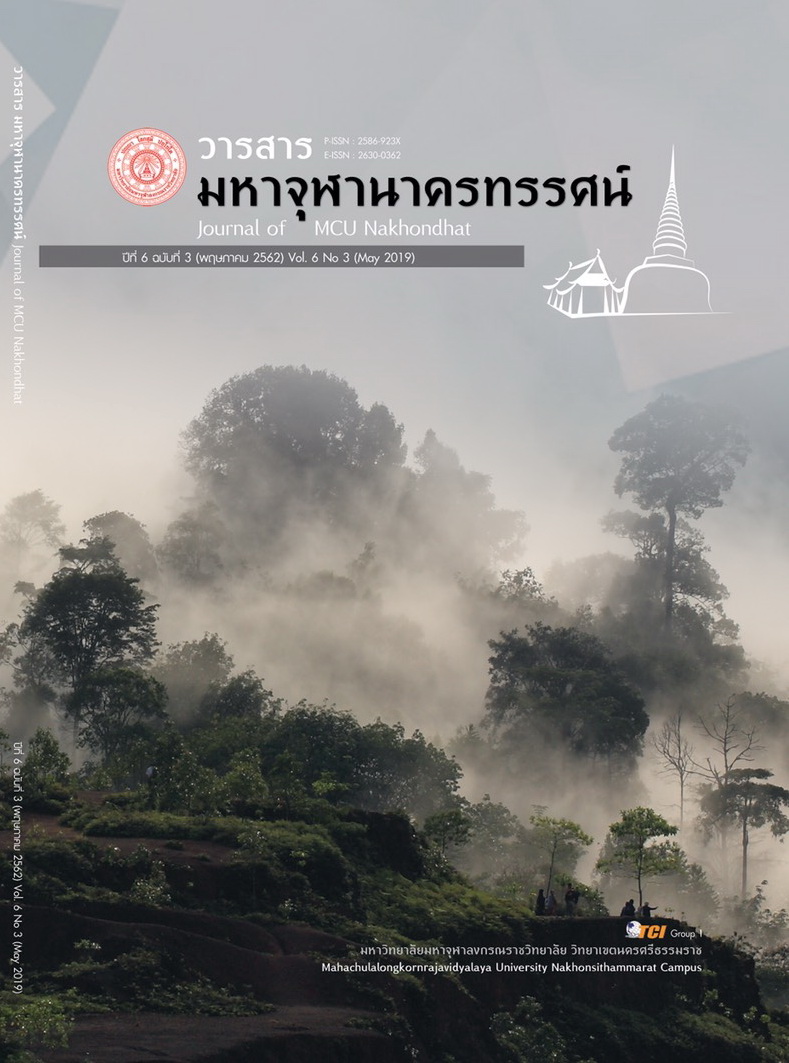SOCIAL CAPITAL: GUIDELINES FOR PROMOTING COMMUNITY-BASED TOURISM OF LAO SONG COMMUNITY IN SUPHANBURI PROVINCE.
Main Article Content
Abstract
The objectives of this research were: 1) to study the social capital characteristics of Lao Song community in Suphanburi Province 2) to study the potential of promoting community-based tourism in Lao Song community in Suphanburi Province 3) guidelines for promoting community-based tourism in Lao Song community Suphanburi Province. This research is a qualitative research. The researcher has studied documents by studying from books, journals, academic documents, internet searching, including studies from related research. Field study by collecting data in the research area using questionnaires as the main tool for collecting information from key informants by in-depth interview of 47 persons and have participated in observations and focus group discussions from experts who are academics, monks, wise villagers, representatives of government agencies, private organizations, community organizations, community leaders and entrepreneurs, totaling 18 persons, using empirical data to make analysis and synthesis, respectively.
The research found that:
- Social capital characteristics of Lao Song community in Suphanburi province, found that the social capital is concrete and abstract in 4 major elements: 1) human elements 2) elements of institutions and community organizations 3) cultural elements, traditions, faith and 4) Elements of wisdom and community ways.
- Potential for promotion of community-based tourism in Lao Song community in Suphan Buri province, found that the community potential that is appropriate to promote Lao Song community tourism has 4 aspects: 1) Community resources 2) Community organizations and leaders 3) Self-management and participation and 4) Network and co-ordination.
- Guidelines for promoting community-based tourism in the Lao Song community in Suphanburi province, found that tourism activities in various tourist attractions should have a network that can work to connect with each other in the public or community organizations in the area. Joined-Up Government, private sector, private entrepreneurs to be a tourism promotion network linked to the way of life, Lao Song community culture in various dimensions is the historical tourism dimension, religious and cultural tourism dimensions and dimensions of community-based tourism and nature.
Article Details
References
ทิพาพร พิมพ์พิสุทธิ์. (2550). “ยุทธศาสตร์การพัฒนาทุนทางสังคมบริเวณลุ่มน้ำปิง จ.ตาก เพื่อการพัฒนาเศรษฐกิจชุมชนอย่างยั่งยืน” รายงานการวิจัย. กรุงเทพมหานคร: มหาวิทยาลัยรามคำแหง.
ประชาธิป กะทา. (2547). “การศึกษาทุนทางสังคมและบทบาทในขบวนการเคลื่อนไหวทางสังคมด้านสุขภาพ : กรณีศึกษาประชาคมสุขภาพหมู่บ้านแห่งหนึ่งในภาคตะวันออกเฉียงเหนือของประเทศไทย”. รายงานการวิจัย: ส่วนวิจัยและพัฒนาสถาบันและวัฒนธรรมศึกษา.
ประยุทธ สืบอารีพงศ์. (2551). โซ่งดอนมะนาว : วิถีชีวิตชุมชนชาวไทยทรงดำบ้านดอนมะนาว อำเภอสองพี่น้อง จังหวัดสุพรรณบุรี. กรุงเทพมหานคร: เพชรเกษม พริ้นติ้ง กรุ๊ป.
ศักดิ์ศิริ นันตะสุขและคณะ. (2550). “การพัฒนาศักยภาพของคนในท้องถิ่นในการบริหารจัดการการท่องเที่ยวแบบยั่งยืนในกลุ่มจังหวัดอีสานใต้”รายงานการวิจัย. กรุงเทพมหานคร: สำนักกองทุนสนับสนุนการวิจัย.
ศุภกิจ วงศ์วิวัฒนนุกิจ. (2555). พจนานุกรมศัพท์การวิจัยและสถิติ. กรุงเทพมหานคร: ด่านสุธาการพิมพ์.
สถาบันการท่องเที่ยวโดยชุมชน. (2540). โครงการท่องเที่ยวเพื่อชีวิตและธรรมชาติการท่องเที่ยวโดยชุมชน (Community Based Tourism). กรุงเทพมหานคร : สถาบันการท่องเที่ยวโดยชุมชน.
สำนักงานท่องเที่ยวและกีฬาจังหวัดสุพรรณบุรี. (2559). เอกสารเผยแพร่. ม.ป.ท.
เสกสรร คำมูลดี และคณะ. (2547). “กระบวนการเรียนรู้เพื่อการพึงตนเองอย่างยังยืนของชุมชนบ้านแม่หวาน ตำบลป่าเมียง อำเภอดอยสะเก็ด จังหวัดเชียงใหม่” รายงานวิจัย. ชุดโครงการการบริหารจัดการท้องถิ่น: สำนักงานกองทุนสนับสนุนการวิจัย (สกว.).


